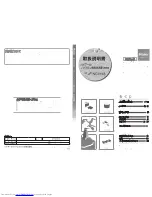
To Thaw Frozen Products
1. Cover the product.
2. Thaw at room temperature. Remember that by defrosting in a warmer
area you promote the growth of bacteria.
3. Always make sure there are no ice crystals in the food before cooking,
especially with the meat. Such crystals mean that the food is not
completely thawed. When this is the case, the cooking temperature
is lower and may not be enough to kill dangerous bacteria.
4. Cook food as soon as possible after thawing.
5. Dispose of and dispose of the liquid lost during thawing.
Thawing frozen foods in the oven
Many ovens (including microwaves) have thawing settings. To prevent
the growth of bacteria, use them only when you want to cook the food
immediately afterwards.
FREEZING OF FRESH PRODUCTS
Your freezer is a 4-star compartment. This means that you can freeze
fresh products, and keep frozen products.
Safety tips:
−
Never refreeze a thawed product unless you cook it again to destroy
harmful bacteria.
−
Never refreeze thawed seafood.
−
Bananas, pomegranates, pears or carbonated liquids must not be
frozen.
Useful tips:
−
To freeze fresh produce, use quality foods that you will handle as
little as possible. Separate your food in small quantities as they
freeze faster, require less defrosting time and allow you to choose
the quantity that best suits your needs.
−
Close your bags correctly when you take out an article. This prevents
food from being dried out or burned in the freezer, as well as frosting
the rest of the food.
EN-
2
3








































